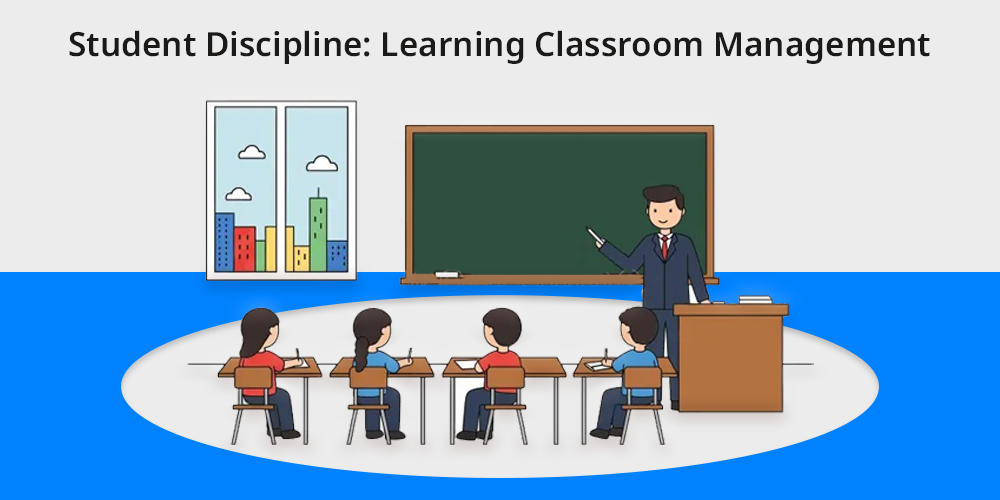
Discipline is one of the pillars which helps to form a person’s character, his actions and his future. There is nowhere where it can be seen more than in the life of a student.
Student discipline in education defines the following norms, rules, and the accepted behaviors in the educational setting. It is characterized by the development of habits, routines and values that support learning, respect and responsibility.
If there is no manners in the classroom, learning becomes difficult and students may not achieve his or her potential.
This essay talks about what student discipline is, why it is necessary, and what are the rules for students. It unfolds further to find ways in which schools can manage and support disciplined behavior.
Contents
What is Student Discipline?
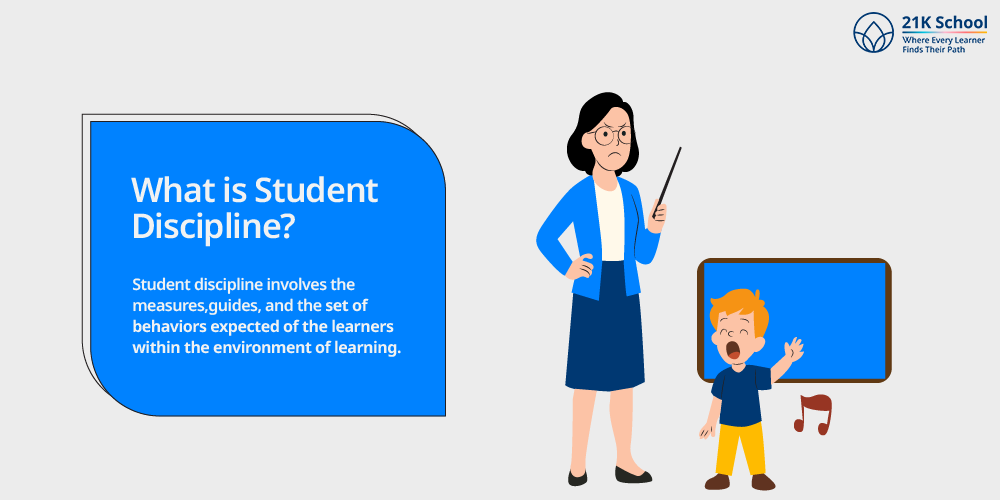
Student discipline involves the measures, guides, and the set of behaviors expected of the learners within the environment of learning.
This is to ensure proper conduct from them. It consists of both proactive as well as the reactive measures put in place to curb misbehavior.
However, that is not all discipline, it’s not just punishment. Discipline is about teaching students to make responsible decisions, realize them being responsible for their consequences and respecting others.
Strict student discipline does not end with just obeying rules. Within self-discipline, students take on values and exercise self-control even when they are not being watched.
Punctuality, responsibility, respect, and involvement in learning responsibilities characterise a disciplined student. It is these characteristics that are required to thrive academically and as an individual.
Importance of Student Discipline
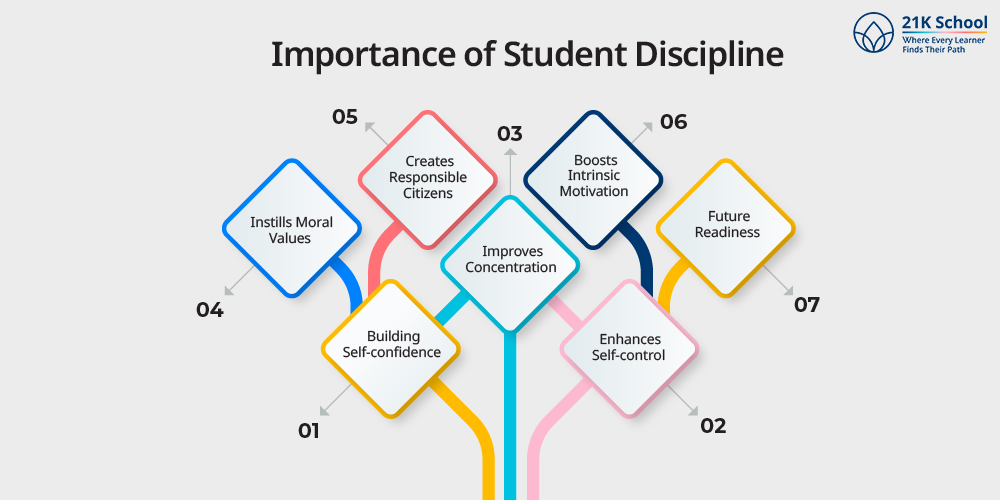
Outcomes of discipline to students are immense and extend far from academic performance. It forms the character of students and prepares them for challenges in life either on a personal or professional level.
Also read the importance of discipline in a students life.
1. Building Self-confidence
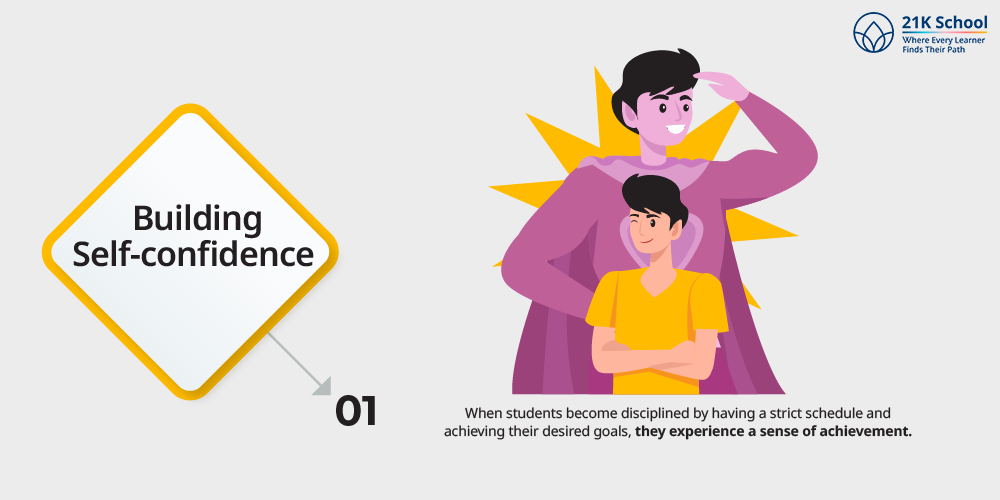
When students become disciplined by having a strict schedule and achieving their desired goals, they experience a sense of achievement. This, in turn, enhances their level of self-confidence.
Read more on study routine techniques, to build a well-structured schedule for your personal as well as personal growth.
Discipline not only allows the students to set smaller tasks and fulfill them but also helps them achieve greater accomplishments. Over a period, this develops a belief that they can also do something great.
2. Enhances Self-control
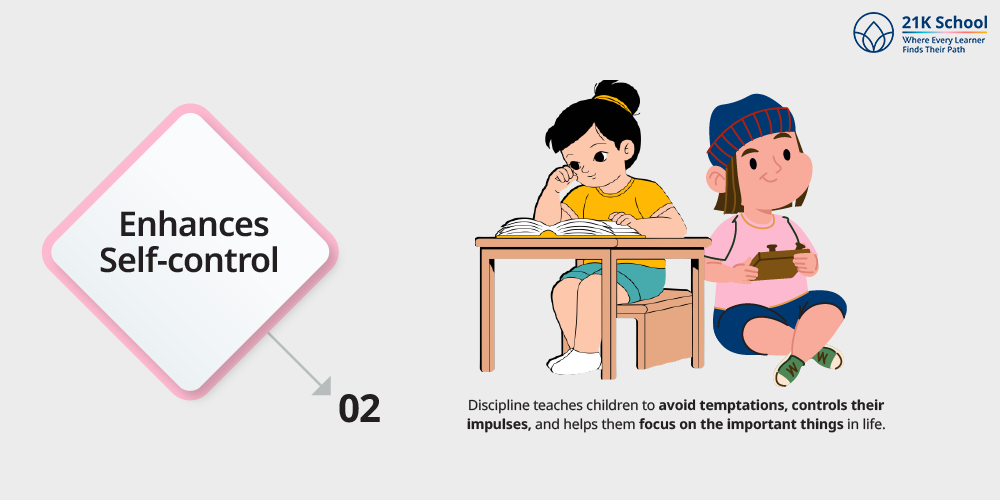
Discipline teaches children to avoid temptations, controls their impulses, and helps them focus on the important things in life.
This capacity to defer gratification and set longer-term objectives as opposed to instant gratifications, is essential to personal development.
If students are not emotionally regulated, they will have mood fluctuations throughout the day. Especially in children it is important to know how to deal with temper tantrums.
For example, when one decides to study for exams while his friends are playing video games that he too loves. Here, he is exhibiting self-control-a very important life skill.
3. Improves Concentration
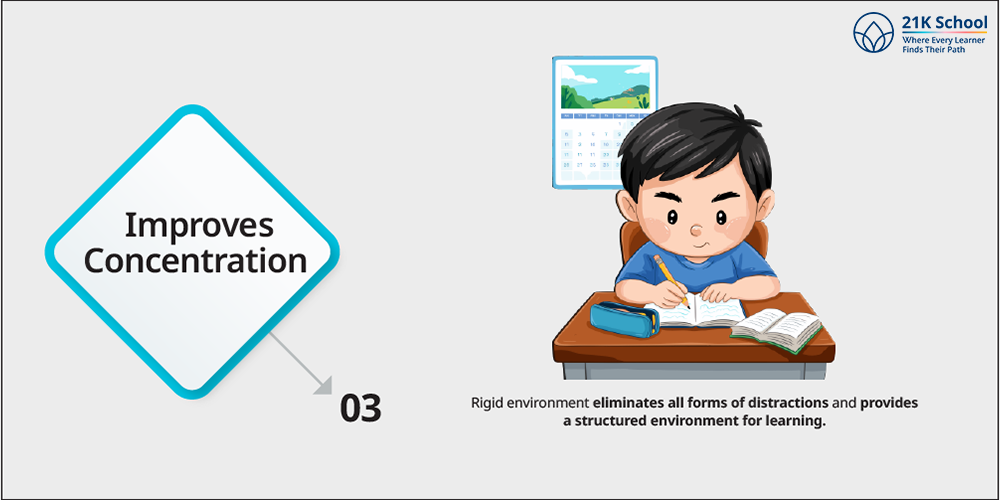
Rigid environment eliminates all forms of distractions and provides a structured environment for learning. Through a routine, students will be able to focus on things to do in hand.
Such as finishing homework, in a lecture, and in groups. This type of attention produces better understanding and schoolwork performance.
4. Instills Moral Values

Discipline greatly relates to moral education. By disciplinary actions and expectations, students acquire values such as honesty, fairness, integrity, and respect.
These values assist them to differentiate right from wrong and stimulate virtuous conduct within and outside school.
5. Creates Responsible Citizens
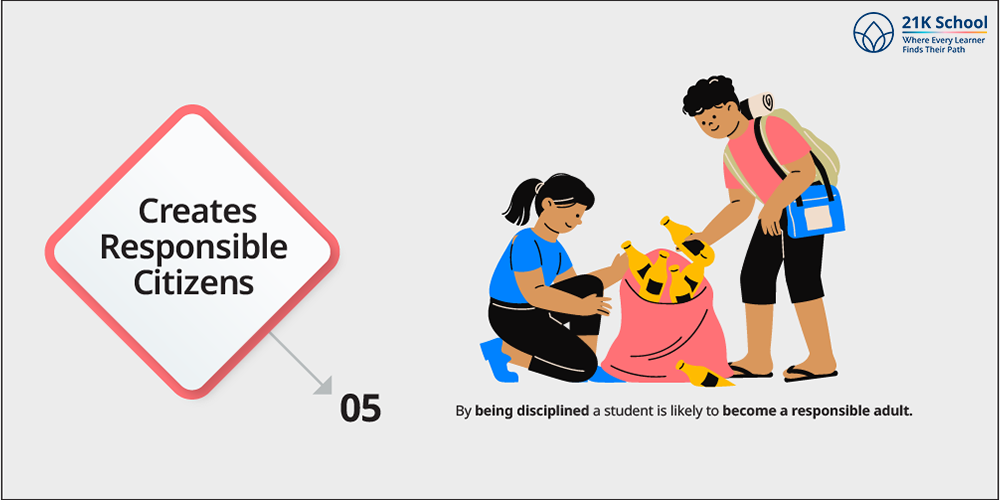
By being disciplined a student is likely to become a responsible adult. They know their position and responsibility in a community and fulfill it.
Through instilling discipline, schools contribute to producing future citizens, who make a positive contribution to society and live by the law.
6. Boosts Intrinsic Motivation
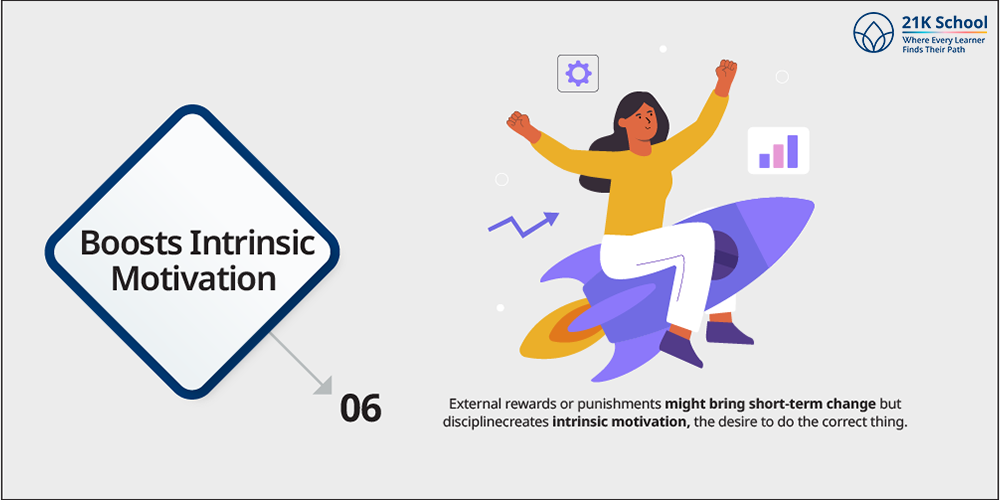
External rewards or punishments might bring short-term change but discipline creates intrinsic motivation, the desire to do the correct thing. Self-disciplined students learn to appreciate education, hard work, and persistence, and not only for the sake of external recognition.
7. Future Readiness
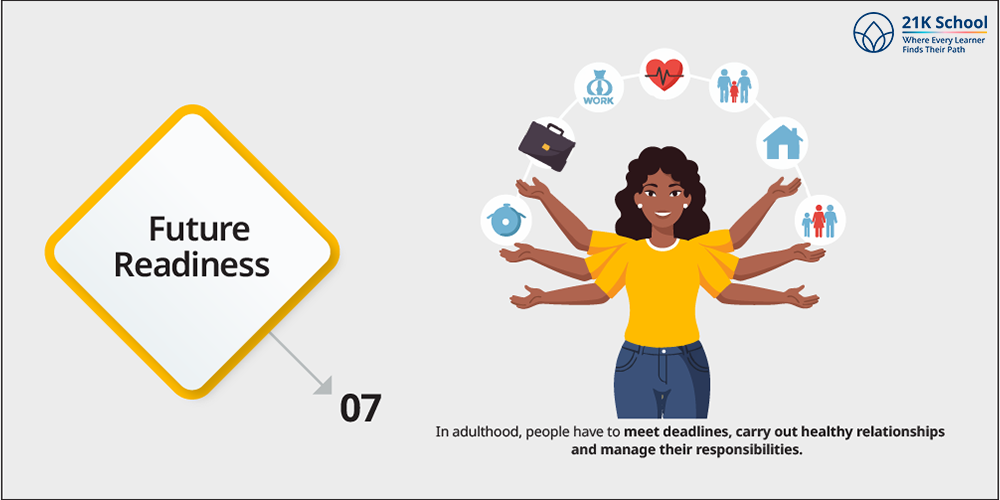
Discipline makes students ready in real life struggles. In adulthood, people have to meet deadlines, carry out healthy relationships and manage their responsibilities.
Pupils who have exercised discipline are able to manage the expectations of schooling, working, and having a family.
Discipline Rules for Students
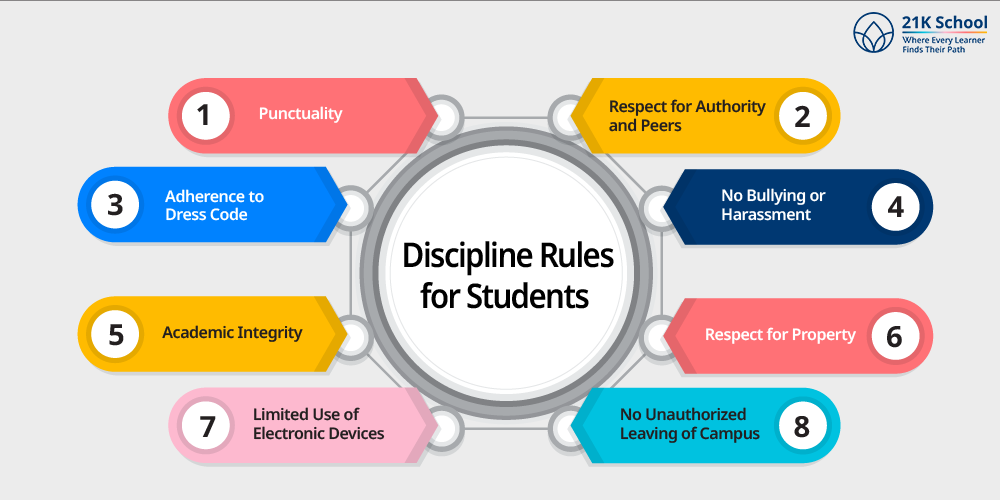
At school, discipline rules, which guide the students’ behavior, are used to establish a favourable and educative environment. These rules do not just encourage academic excellence.
But it also instills life values like respect, responsibility and integrity among students. Common discipline rules set for students and their relevance are as below:
1. Punctuality
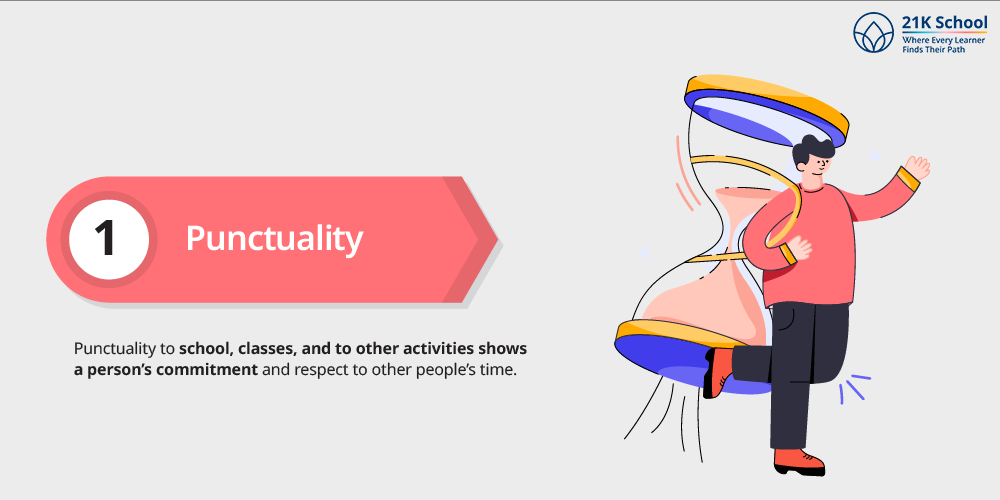
Punctuality to school, classes, and to other activities shows a person’s commitment and respect to other people’s time. It pushes learners to be prepared within time and cease the upcoming opportunities in life.
- Execution: The schools can monitor the attendance and tardiness of students. They can reward punctual students publicly, and provide incentives in the form of redeemable points for consistent attendance.
2. Respect for Authority and Peers
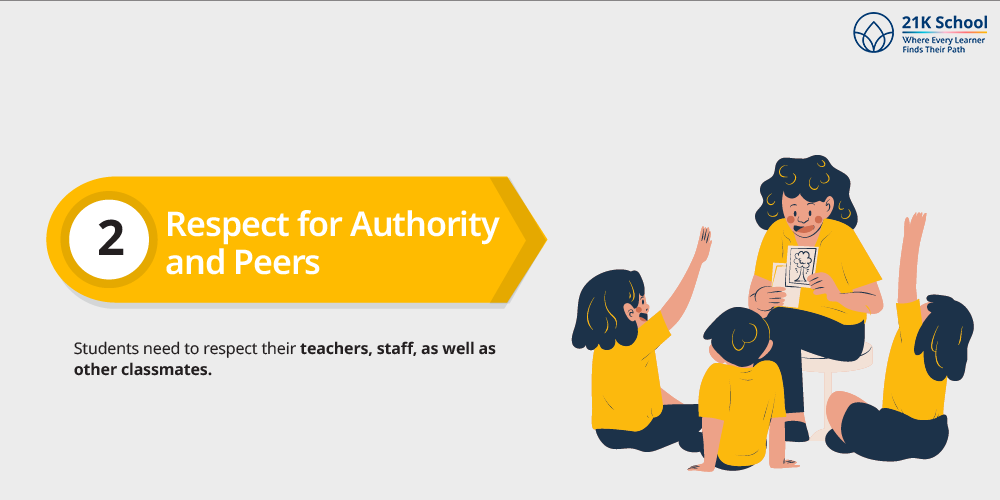
Students need to respect their teachers, staff, as well as other classmates. The obstruction of the learning environment is caused by disrespectful behaviour, interruptions or disobedience.
- Execution: Backup classroom behavior with agreements and carry out regular talk on mutual respect, empathy and boundaries.
Red on to learn more about behavioral problems in schools and solutions to fix it.
3. Adherence to Dress Code
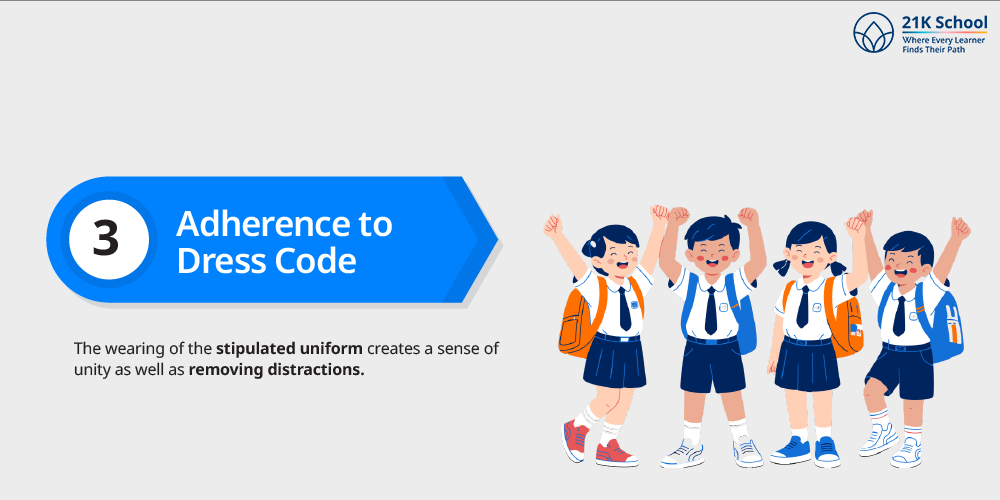
The wearing of the stipulated uniform creates a sense of unity as well as removing distractions. Adhering to a dress code should be a compulsion to teach students discipline.
- Execution: Schools should educate students about the significance of dress code and consult with student councils on tailoring it up to changes.
4. No Bullying or Harassment
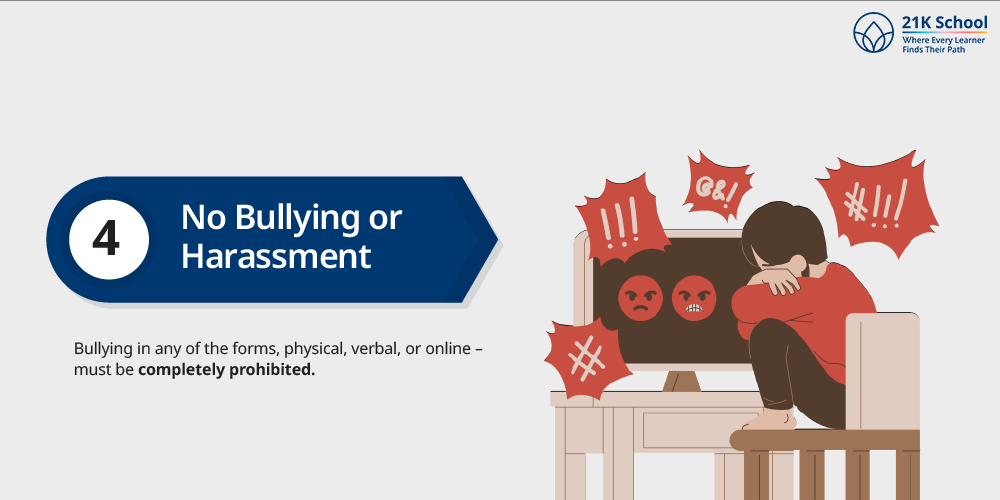
Bullying in any of the forms, physical, verbal, or online – must be completely prohibited. This would provide students an opportunity to grow and excel in a positive learning environment.
- Execution: Hold anti-bullying workshops, employ anonymous reporting systems, and have explicit consequences for rule-breaking.
Get a detailed understanding of school bullying statistics by reading this blog.
5. Academic Integrity

Cheating, plagiarism, or falsification of records destroys trust and the sense of fairness. While giving exams and assessments, it is vital to stay honest even if not under direct supervision.
- Execution: Make use of plagiarism checkers and talk about the importance of original work, and set clear policies with implications for dishonesty.
6. Respect for Property
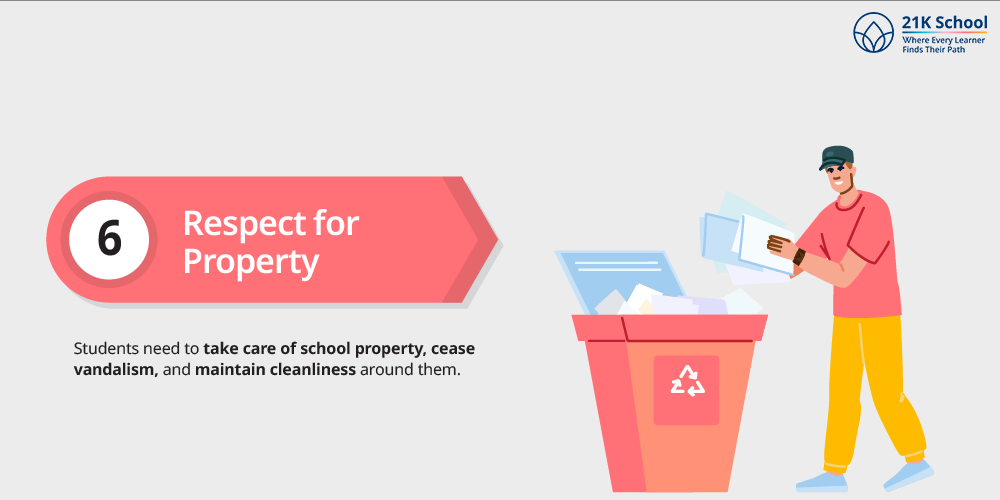
Students need to take care of school property, cease vandalism, and maintain cleanliness around them. Awareness should be brought through workshops so that students develop respect for institutional infrastructure.
- Execution: Arrange for classroom work for maintenance, carry out cleanliness drives, and teach students on resource conservation.
7. Limited Use of Electronic Devices
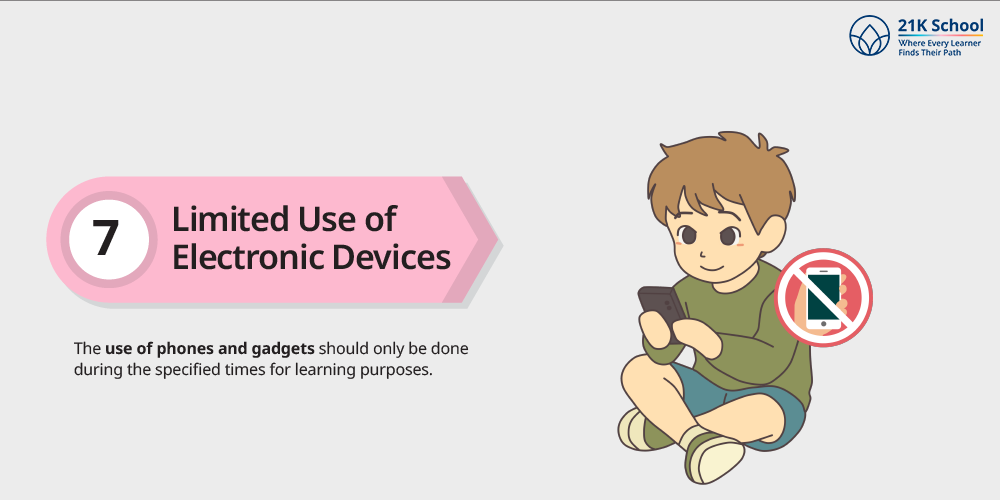
The use of phones and gadgets should only be done during the specified times for learning purposes. Using phones in limits pushes students towards self-control and alignment with surroundings.
- Execution: Establish phone usage guidelines, use device lockers in class, and incorporate technology into the lessons responsibly.
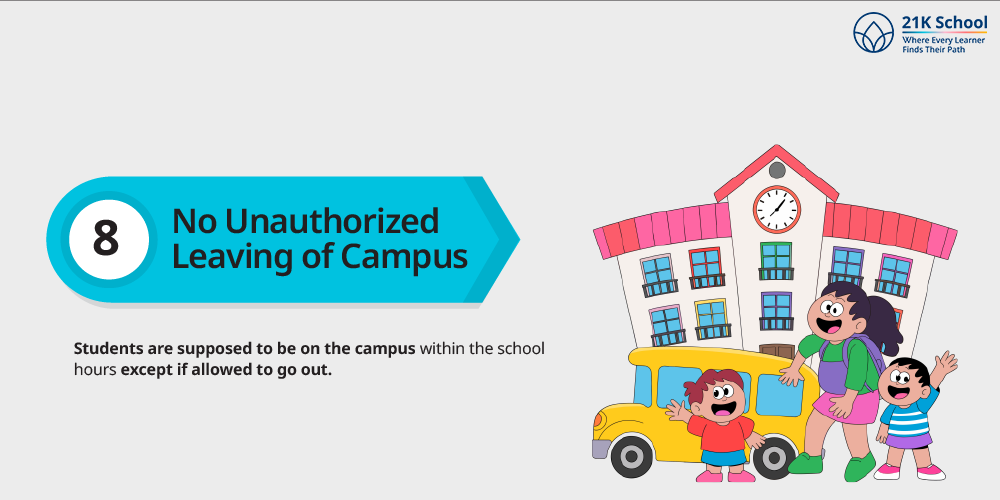
Students are supposed to be on the campus within the school hours except if allowed to go out. Schools with low command and management have students who bunk classes more often.
- Execution: Use ID tracking, keep gate passes, and sensitize students on the need for campus security.
Through proactive communication of such rules to apply them consistently, schools contribute to establishing a respectful and safe environment for studying and development.
How to Handle Student Discipline in School?
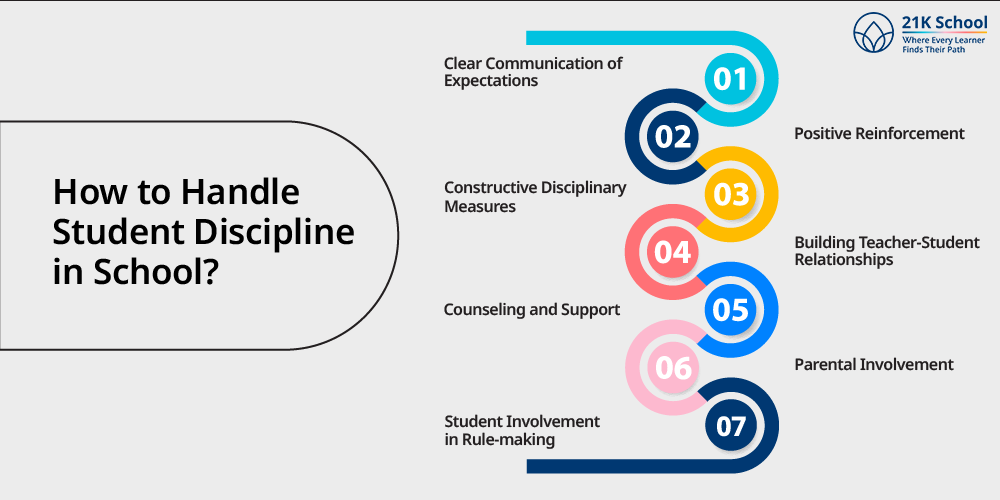
Discipline of students needs to be handled in a balanced manner – firm, fair, but geared towards growth rather than punishment. Below are some of the methods that the schools can incorporate:
1. Clear Communication of Expectations
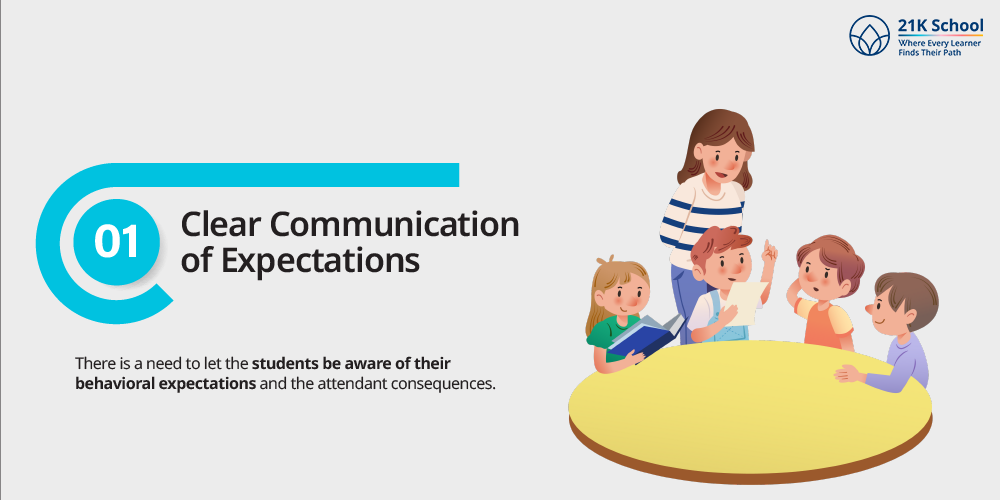
There is a need to let the students be aware of their behavioral expectations and the attendant consequences.
These should be taught during orientations, posted where they can be usefully viewed and taught continually. Constant implementation of rules is important to win the respect and trust of the students.
- Suggested Method: Show the post behavioral expectations in places where everyone can see them, such as classrooms and hallways. It will help students often review the rules and remember the consequences.
2. Positive Reinforcement
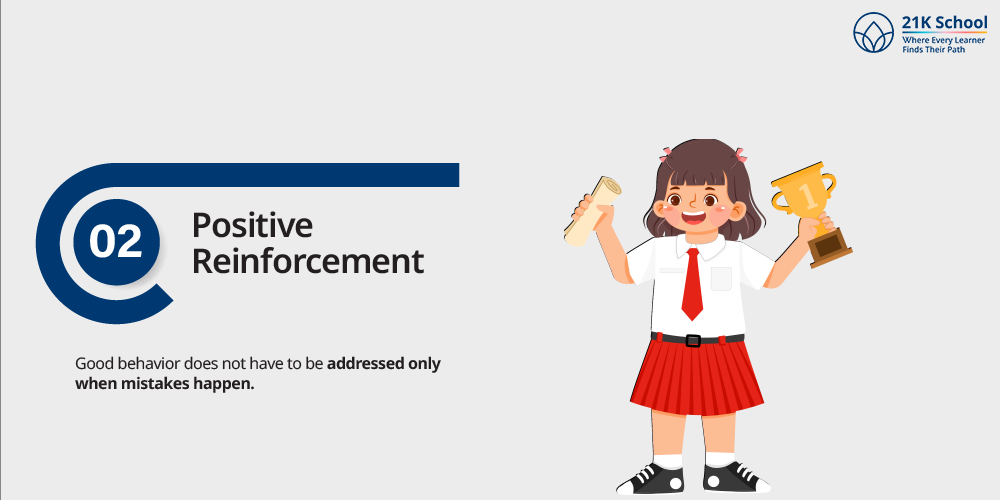
Good behavior does not have to be addressed only when mistakes happen.
Positive reinforcements through certificates, classroom privileges or praise for consistent discipline drive other students also to follow that.
- Suggested Method: Give out items or accept gestures that publicly show recognition for students who often obey school rules.
3. Constructive Disciplinary Measures
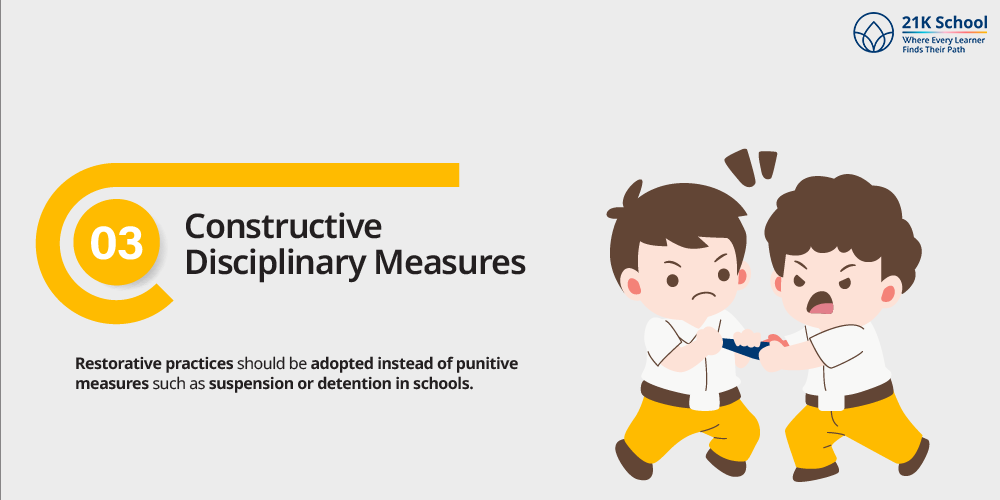
Restorative practices should be adopted instead of punitive measures such as suspension or detention in schools.
These include conflict resolution sessions, community service, or reflective writing assignments, for which students can learn from their mistakes.
- Suggested Method: Let students resolve their differences, complete community projects, or write about themselves to learn responsibility.
4. Building Teacher-Student Relationships
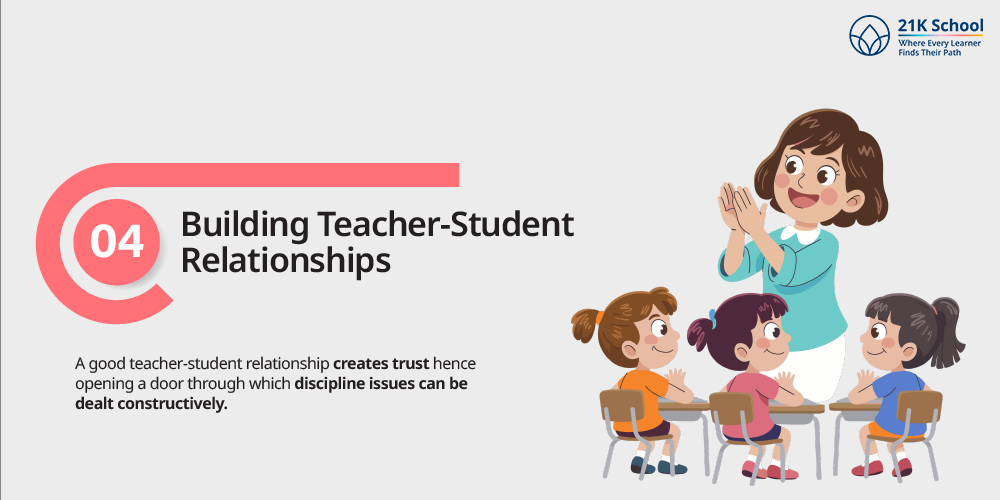
A good teacher-student relationship creates trust hence opening creates trust hence opening a door through which discipline issues can be dealt constructively.
More respect and listening from teachers are likely to be received if they act empathetically and fairly towards the students.
- Suggested Method: Make sure to get to know your students by listening, being understanding, and using the same rules for everyone.
5. Counseling and Support

Receiving assistance from counselors to find healthier ways of dealing with mental-health issues of students instead of acting out.
There are also times when misbehavior is rooted in deeper personal or psychological problems.
- Suggested Method: Give counseling to students in need. Also, enable students to join peer support groups to talk about their problems and learn from fellow students.
6. Parental Involvement
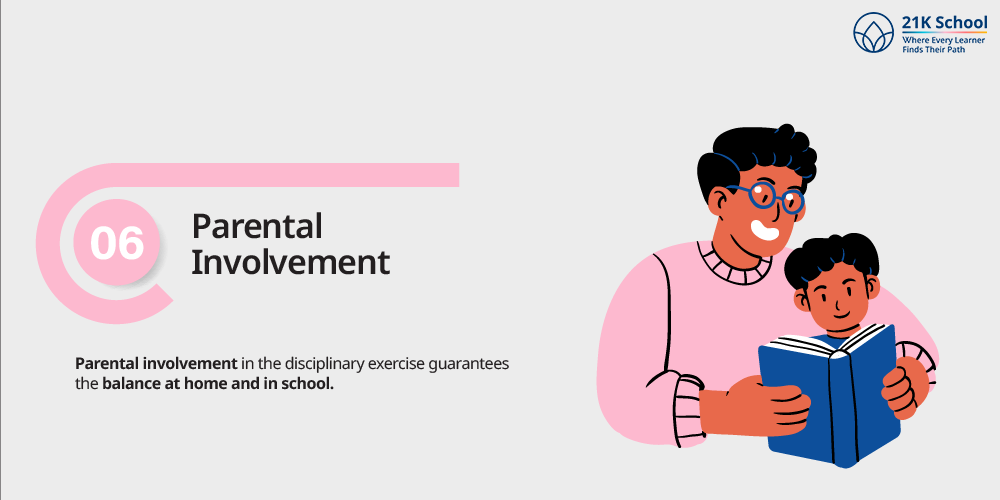
Parental involvement in the disciplinary exercise guarantees the balance at home and in school.
The continuity of communication, parent-teacher meetings and updates with regard to behavior aid to reinforce desired behavior.
- Suggested Method: Make sure to keep parents informed about their child’s performance at school by using email, sending newsletters, or meeting through parent-teacher conferences.
7. Student Involvement in Rule-making
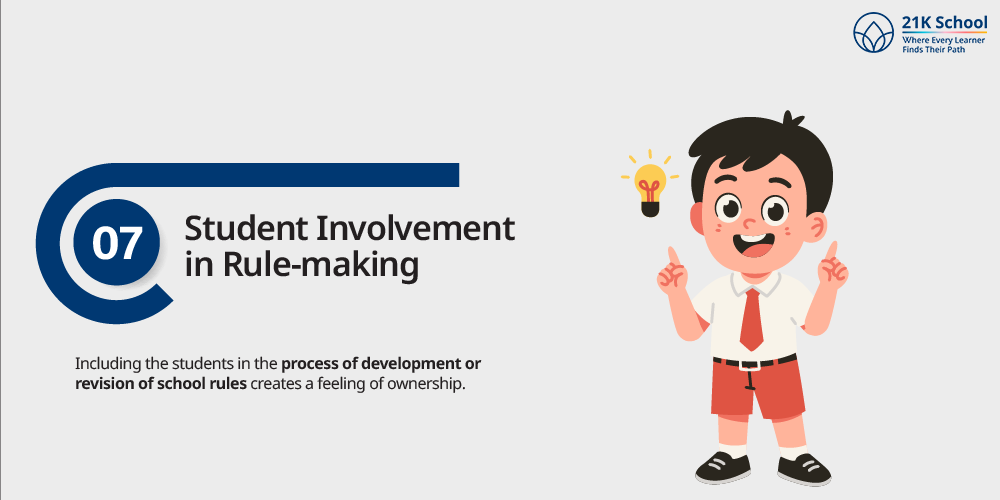
Including the students in the process of development or revision of school rules creates a feeling of ownership.
When students feel that they are part of the rule-makers themselves, they are likely to adhere to the set rules.
- Suggested Method: Give students an opportunity to share and help shape decisions on the rules at school by forming such committees.
How to Improve Discipline in a Student’s Life?
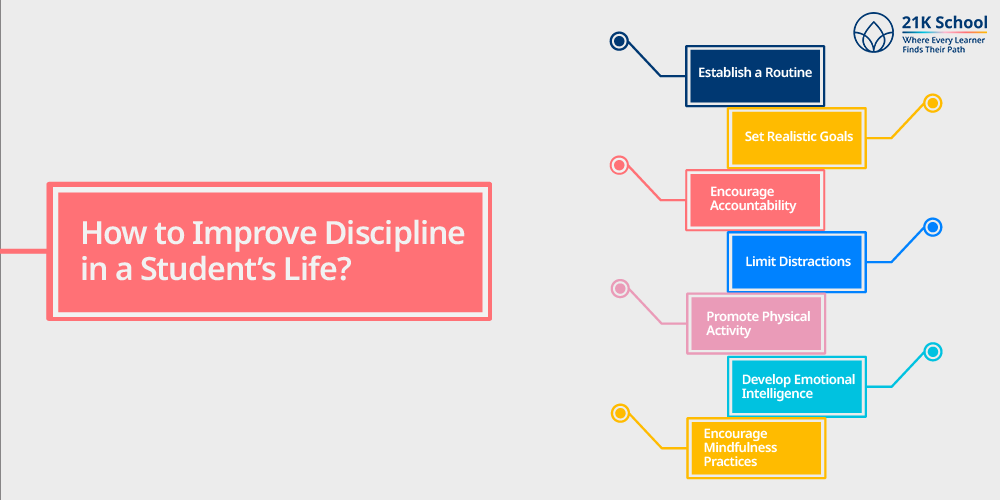
Although discipline is a school-taught concept, making it a life-long habit entails personal willingness and support from the outside world.
Below are some of the ways of enhancing discipline in the life of a student.
1. Establish a Routine
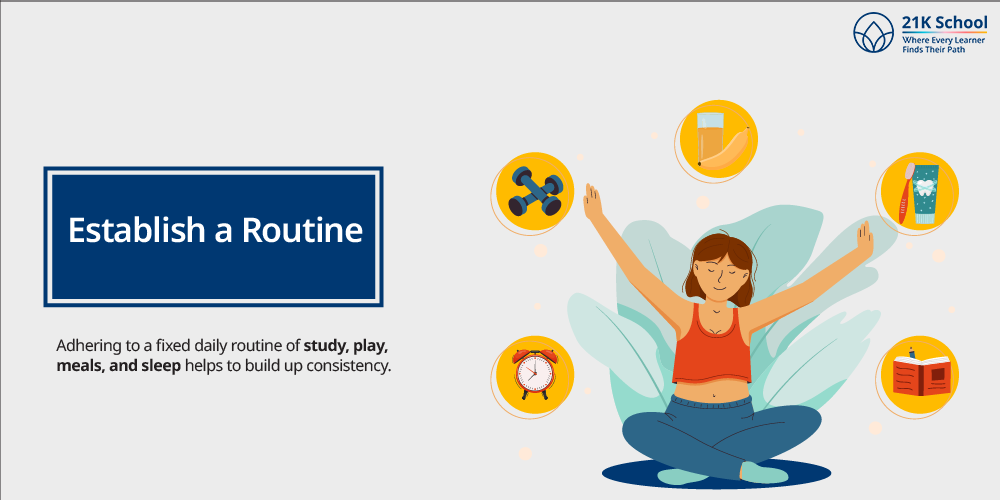
Adhering to a fixed daily routine of study, play, meals, and sleep helps to build up consistency. When students are aware of what they are going to face, they are likely to manage time properly.
Why it matters:
A structured daily schedule brings predictability, and also instills a feeling of order, leaving out stress and enhancing time-management.
How to execute:
- Guide students to come up with a daily timetable that is simple and has allowance for study, meals, play and sleep.
- Use printed or electronic planners to monitor the tasks on a daily basis.
- Create consistency by modifying the school routine once a week.
2. Set Realistic Goals
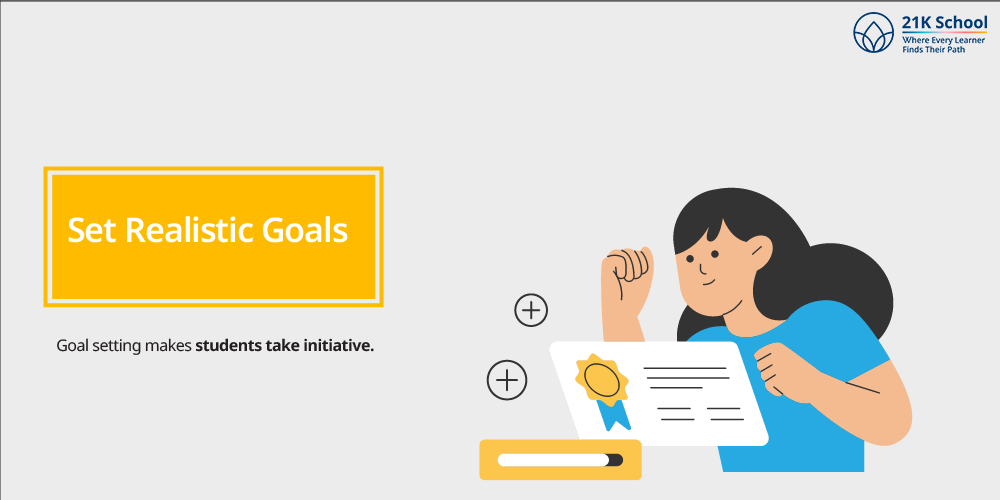
Goal setting makes students take initiative. Small attainable goals give them a sense of focus and help them to understand the progress made which develops disciplined behavior.
Why it matters:
Goal setting will sustain the efforts of students and keep them on their toes. However, the progress will give them confidence and inspire them to do more.
How to execute:
- Teach students how to set SMART goals (Specific, Measurable, Achievable, Relevant, Time-bound).
- Break down big tasks (examples of such include a project or exam preparations) into achievable weekly/daily targets.
- Utilize goal trackers or charts, and provide reward for achievements in the form of verbal praise or small prizes.
3. Encourage Accountability
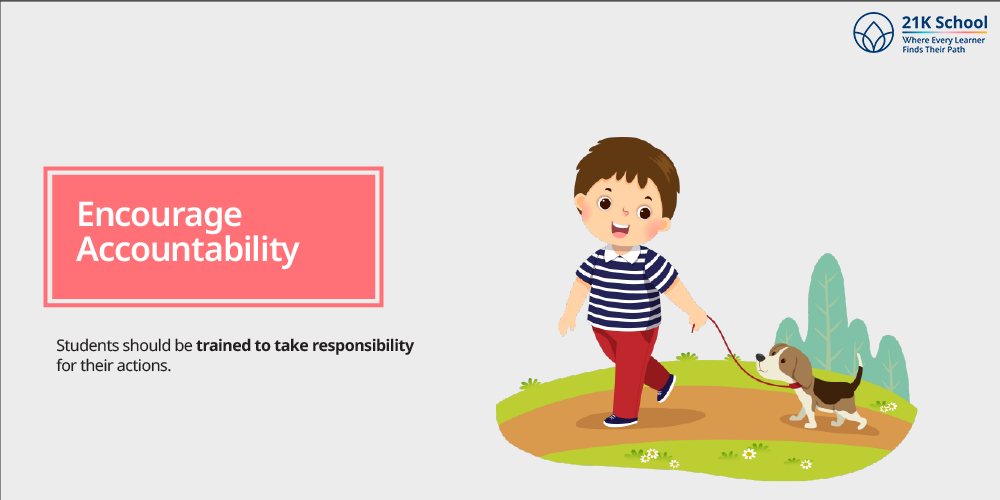
Students should be trained to take responsibility for their actions. Accountability can either be taking responsibility when doing homework on time or when it comes to errors. It is a part of self-discipline.
Why it matters:
As students take responsibility for their deeds and end results, they gain a sense of accountability and self-discipline.
How to execute:
- Infer personal checklists or self-monitoring charts on the students.
- After a mistake or a violation of the rule, you should ask the students to write reflection letters or talk about what they can change.
- Motivate peer accountability, so that partners follow each other up.
4. Limit Distractions
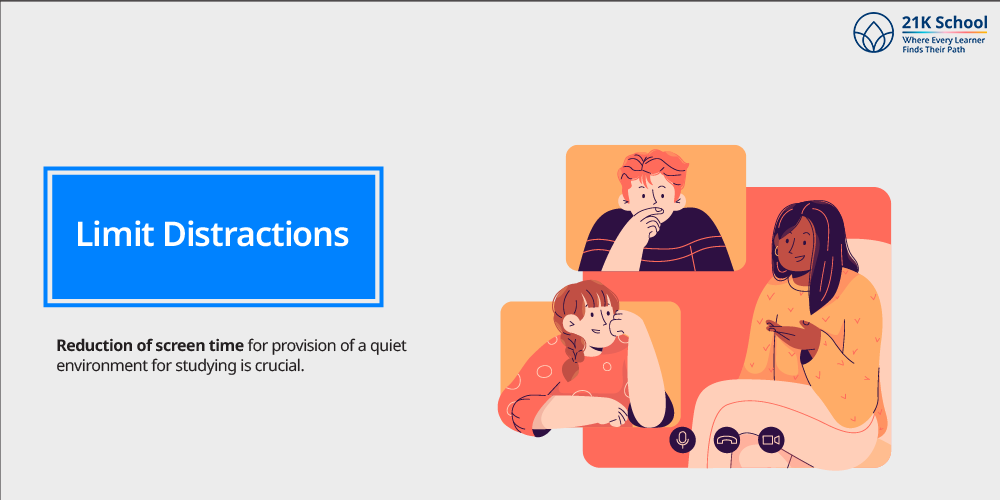
Reduction of screen time for provision of a quiet environment for studying is crucial. Limitations of phone usage during learning periods can intensely boost concentration and self-discipline.
Why it matters:
Less distraction websites mean better focus, increased productivity and learning outcomes.
How to execute:
- Assign a space for learning that is quiet and practically free of clutter, with few electronics.
- In the study periods, use website blockers (e.g., StayFocusd or Forest app) to avail focus.
- Have set periods for usage of devices and time for breaks to prevent unnecessary screen time.
5. Promote Physical Activity
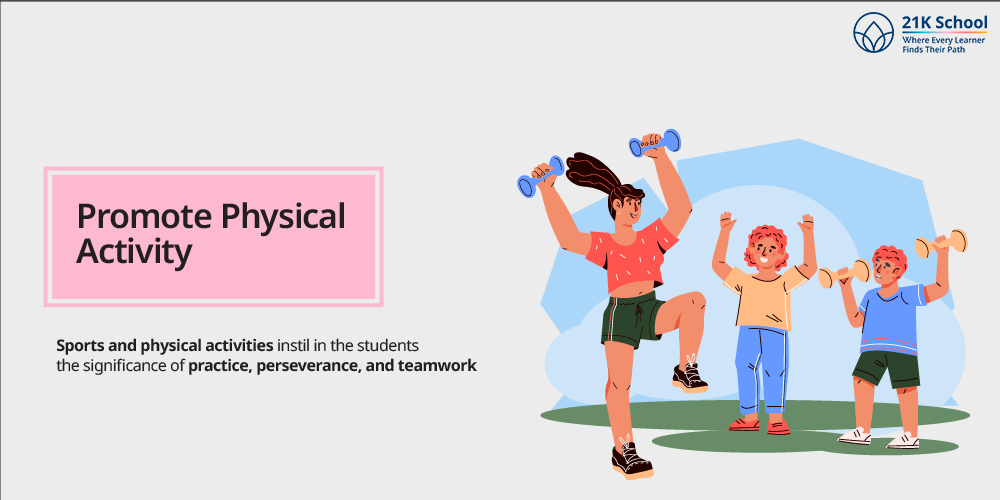
Sports and physical activities instil in the students the significance of practice, perseverance, and teamwork. This indirectly aids in discipline as it helps to develop endurance and patience.
Why it matters:
Exercise increases energy, attention, and mood – all of which strengthen the discipline in studies and conduct.
How to execute:
- Plan about 30–60 minutes of physical activities every day – sports, walking, or home exercises.
- Support the participation in school teams or sports groups in the community.
- Take active breaks between hours of studying to clear the mind.
6. Develop Emotional Intelligence
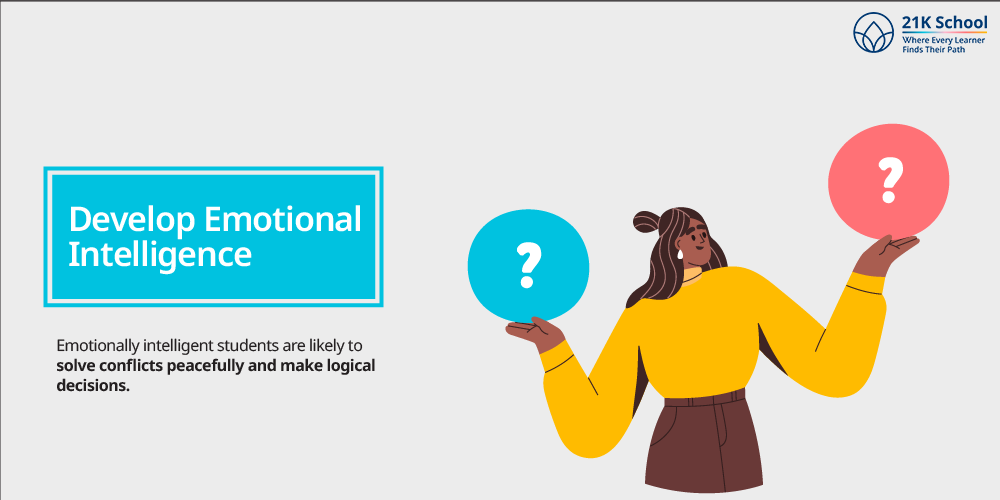
Emotionally intelligent students are likely to solve conflicts peacefully and make logical decisions. Understanding and controlling the emotions of students can stop impulsive behavior.
Why it matters:
It is students who regulate their feelings that are less likely to act on impulse and remain disciplined during challenging times.
How to execute:
- Teach the students how to name and express their emotions through such activities as journaling or emotion cards.
- Role play some of the common peer conflict scenarios and discuss how to respond appropriately.
- Incorporate social-emotional learning (SEL) lessons in the classroom curriculum.
7. Encourage Mindfulness Practices
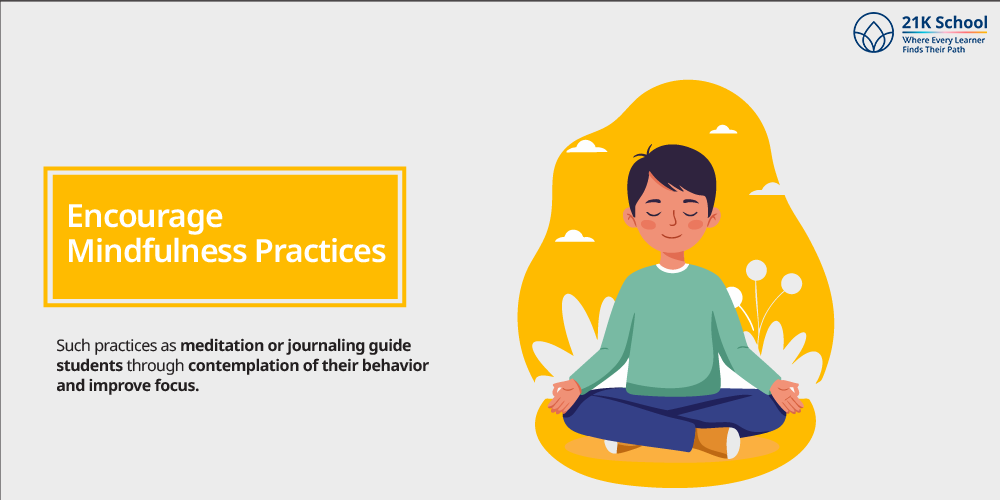
Such practices as meditation or journaling guide students through contemplation of their behavior and improve focus. These practices can ease student stress and increase self-discipline with time.
Why it matters:
Mindfulness enables students to be grounded, control stress, and take thoughtful decisions – all pillars of a disciplined person.
How to execute:
- Start or conclude the school day with a 5-minute breathing or mindfulness exercise.
- Try guided meditation applications (like Headspace or Calm) particularly before tests or under stressful periods.
- Stimulate daily journals or grats logs that will facilitate reflection and awareness of self.
Benefits of Student Discipline
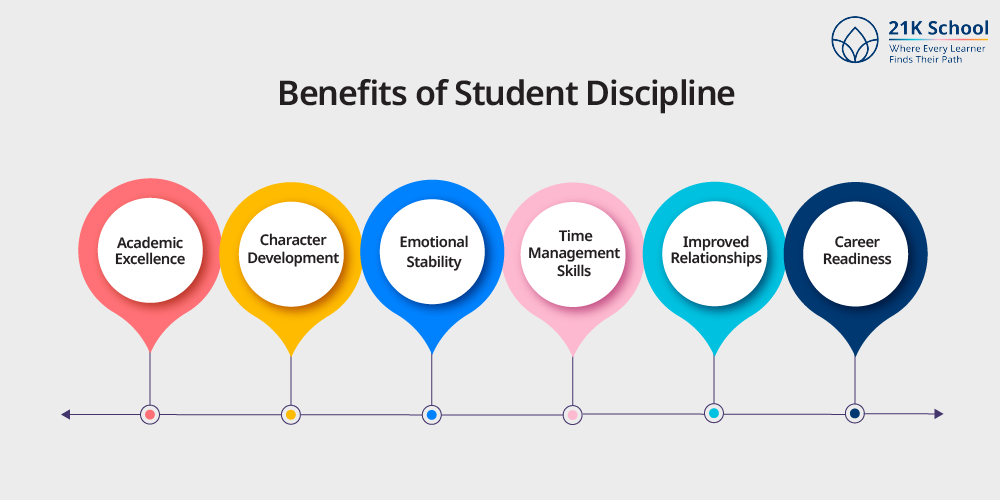
Student discipline supports both quick and lasting achievements in school, relationships, and future professional life. To be disciplined, students must focus on what they need to do now and also build the traits they’ll rely on in life.
1. Academic Excellence
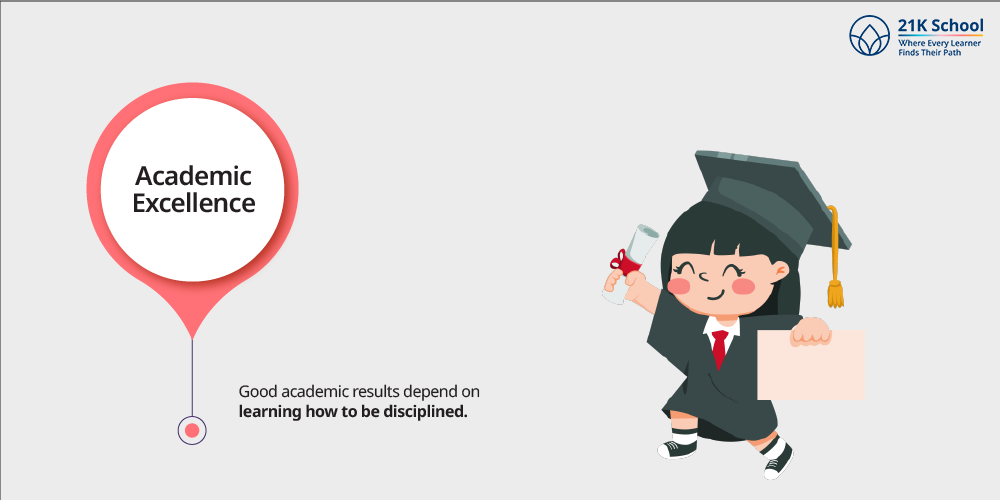
Good academic results depend on learning how to be disciplined. Punishment for misbehavior helps students attend every class and manage their time well.
As a result of discipline, students do better in school because they remember lessons, work hard on assignments, and study well for tests.
Elaboration:
- Sticking with the same study habits helps students absorb difficult ideas more smoothly.
- Having better control over your time helps you split up big assignments, making you less stressed and limiting urgent preparation.
- Attentive students contribute to class assignments and are able to learn better because they take part in the discussions.
2. Character Development
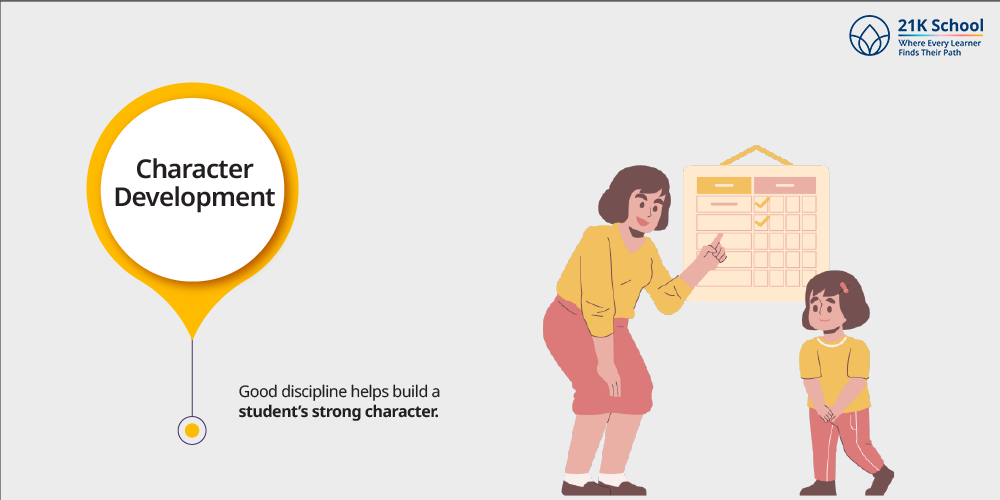
Good discipline helps build a student’s strong character. It makes children grow with honesty, humility, respect, integrity, and a great sense of responsibility.
These traits guide students in right and wrong and help them make good decisions in tough situations.
Elaboration:
- Being honest and upright helps students choose the right actions for both their studies and their private lives.
- Having respect for people around you encourages them to cooperate and understand one another.
- By being humble, students admit when they don’t know something and accept guidance or teaching from fellow learners.
- The application of discipline helps students do well in school, and mature emotionally and socially as they develop.
3. Emotional Stability
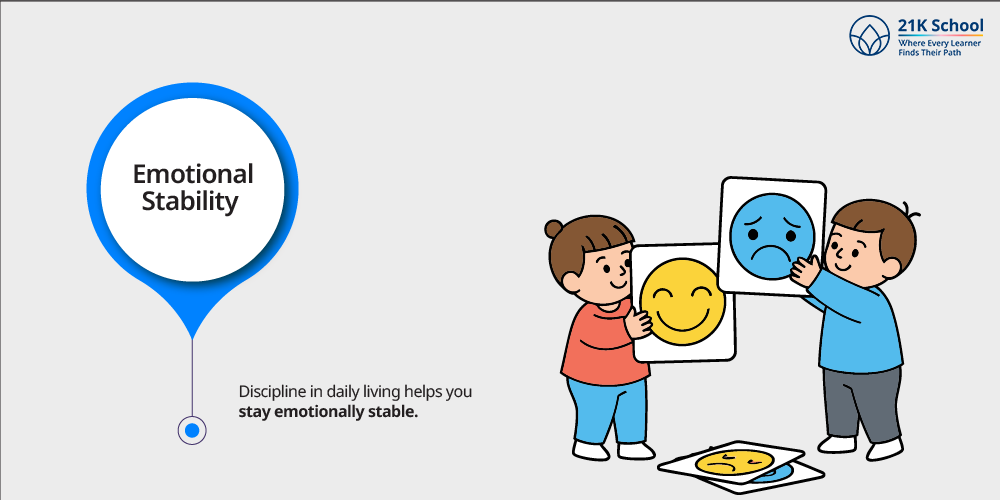
Discipline in daily living helps you stay emotionally stable. Sticking to routines, staying orderly, and managing how they use their time helps students avoid exam stress and anxiety.
Learning to be disciplined gives students a healthier way to manage their school, personal, and social tasks.
Elaboration:
- Not being in absolute control of their schedule puts students at greater risk of procrastination and stress.
- Following daily routines gives students security and makes it easier to remain calm during the school day.
- Knowing tasks will be done on time and deadlines met, lowers worries and makes anyone more confident.
- Stable emotions in students give them the ability to manage both school stress and personal difficulties.
4. Time Management Skills
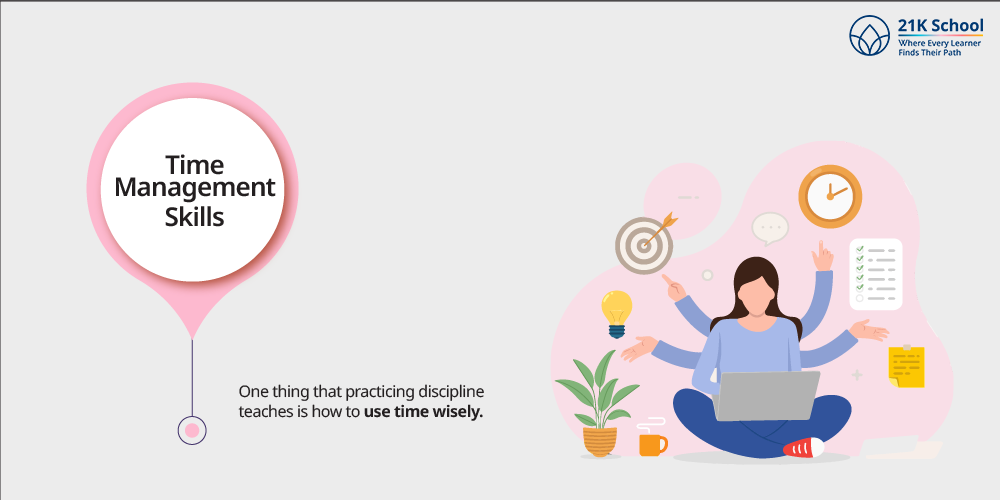
One thing that practicing discipline teaches is how to use time wisely. Anyone who develops a structured way of studying can manage their time, and sort out their most important tasks.
Being able to use these skills supports academic achievement and prepares you for your future jobs in the 21st century.
Elaboration:
- Being aware of what is most important first and studying those subjects, students avoid wasting their time.
- By using organizational skills, students organize their work and do not forget to complete tasks in time.
- When you don’t put off tasks, you feel less stressed and get more done.
- Students can easily use these skills in all parts of their lives. Especially, to make it easier to juggle duties at school, in sports or clubs, and at home.
5. Improved Relationships

Good relationships with others rely a lot on discipline. Students who are well-behaved and respectful are more likely to get along with their teachers, other classmates, and their family.
Elaboration:
- If students use respect when communicating, they are able to handle disputes more easily and create a team spirit.
- As a result of empathy, students can figure out and relate to the emotions of others. Thus, helping them to make better friends and feel like part of a group.
- Because of responsibility, students are able to stick to their commitments in groups and at home. This increases the trust others in their lives have in them.
- A regulated way of speaking and acting allows students to develop relationships. This would benefit them both in school and in their future jobs.
6. Career Readiness
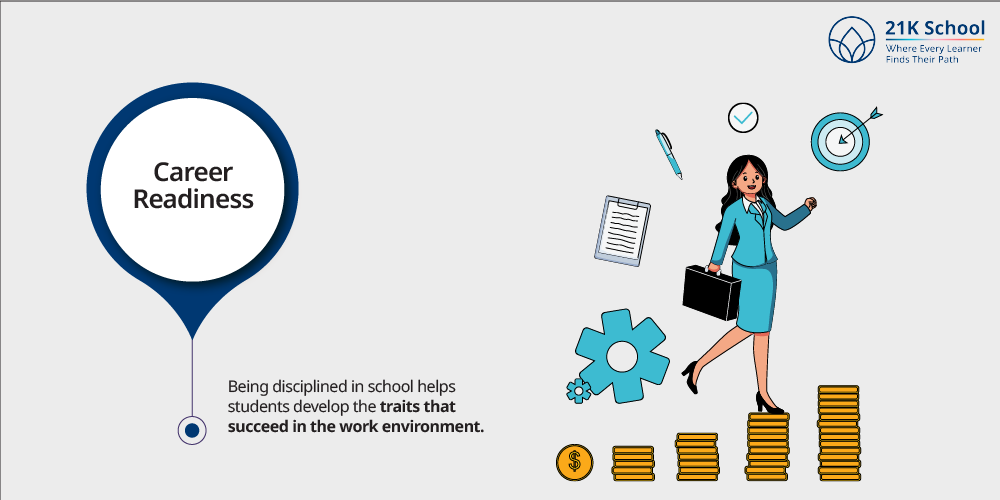
Being disciplined in school helps students develop the traits that succeed in the work environment. Operating with discipline now in school gives students a headstart in facing challenges at work later.
Elaboration:
- To do well in your job, you need to arrive at the right time, not miss deadlines, and show up for meetings. Students who organize their time well will find it easy to start handling their workload in professional situations.
- By being disciplined, students learn they should finish what they start and be present for meetings or work within deadlines. Employers appreciate those who can get jobs done on their own.
- Disciplined students realize that being reliable matters. Professional success is often built around showing up on time and working to high standards.
- Having discipline motivates you to achieve what you set out to do. People who are self-driven at work are more productive and usually don’t need close supervision.
Roles of Teachers in Disciplining Students
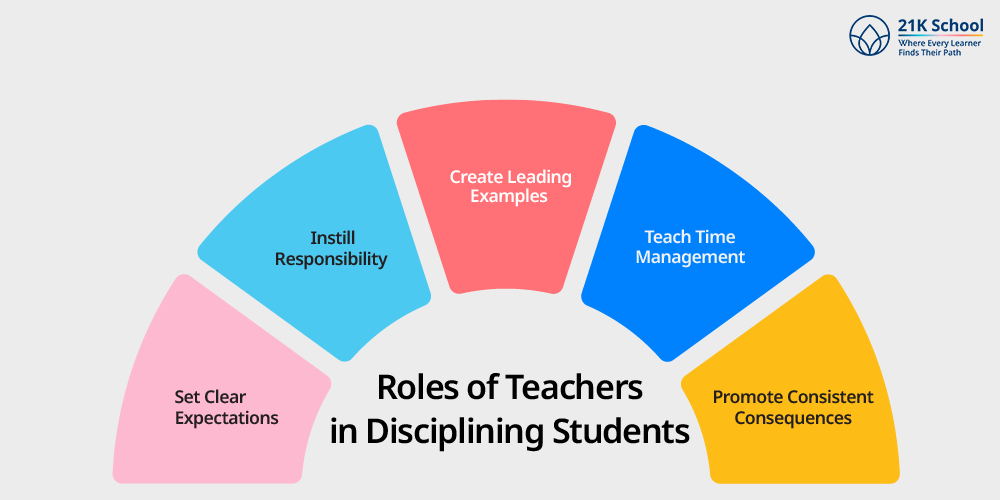
Discipline among the students can be fostered by the teachers. They have a great impact on how students behave and develop.
Mostly, when it comes to the things that they do, what they expect and how they teach.
1. Set Clear Expectations
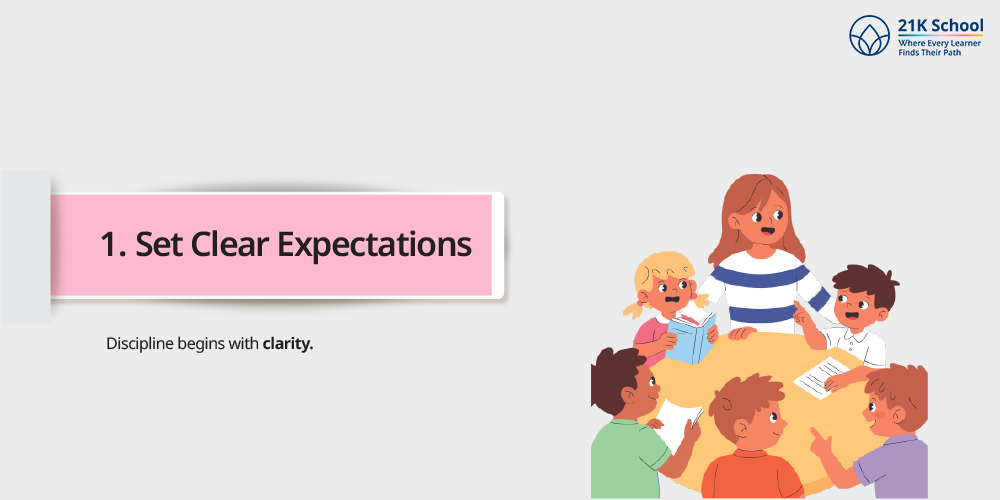
Discipline begins with clarity. Classroom rules, behavioral standards, and expectation of academic work must be communicated by teachers at the beginning.
This establishes what is right and wrong to the students. When the expectations are clear and maintained, then the students are likely to follow the set boundaries.
2. Instill Responsibility
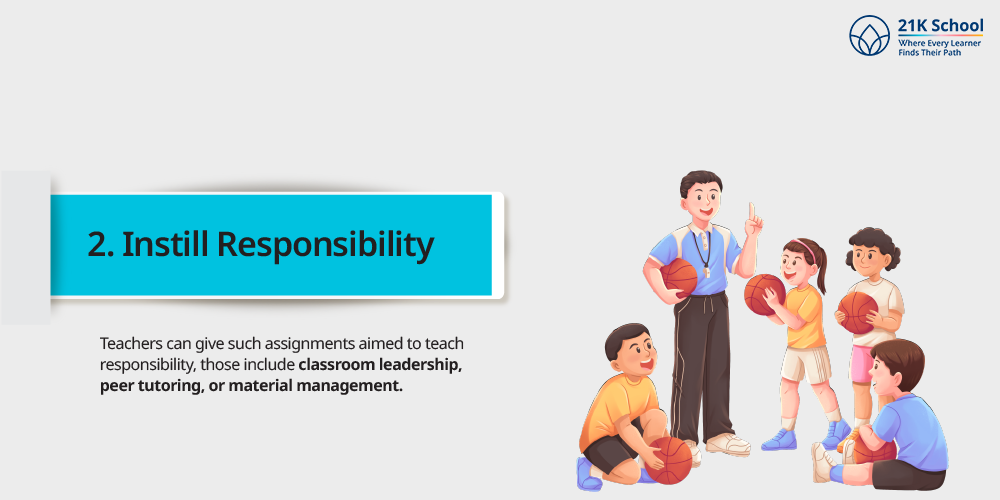
Teachers can give such assignments aimed to teach responsibility, those include classroom leadership, peer tutoring, or material management.
These responsibilities make students feel trusted and valued, which instigates them to behave responsibly.
3. Create Leading Examples
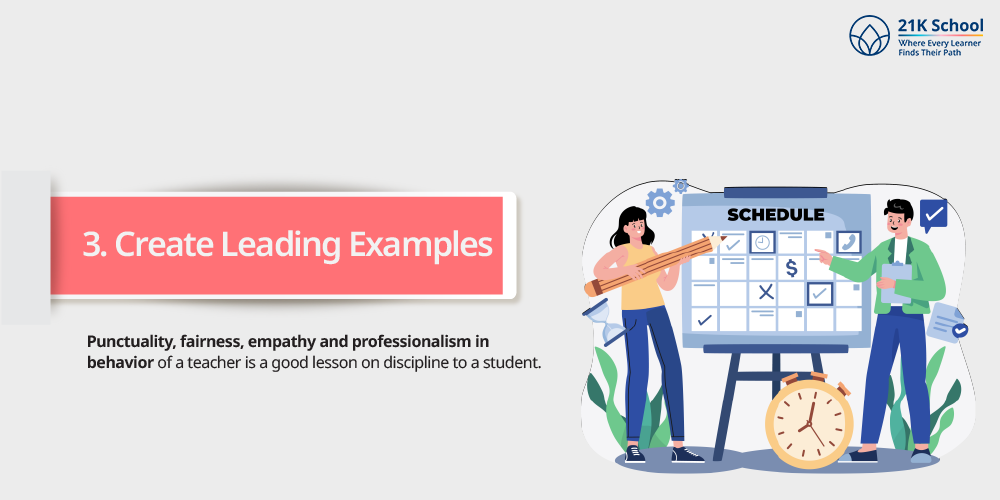
The example of the teacher’s own behavior is tremendously strong. Punctuality, fairness, empathy and professionalism in behavior of a teacher is a good lesson on discipline to a student.
Teachers need to demonstrate the behavior that they would like to see from the students. Therefore, the chances are high that the students will emulate the behavior.
4. Teach Time Management
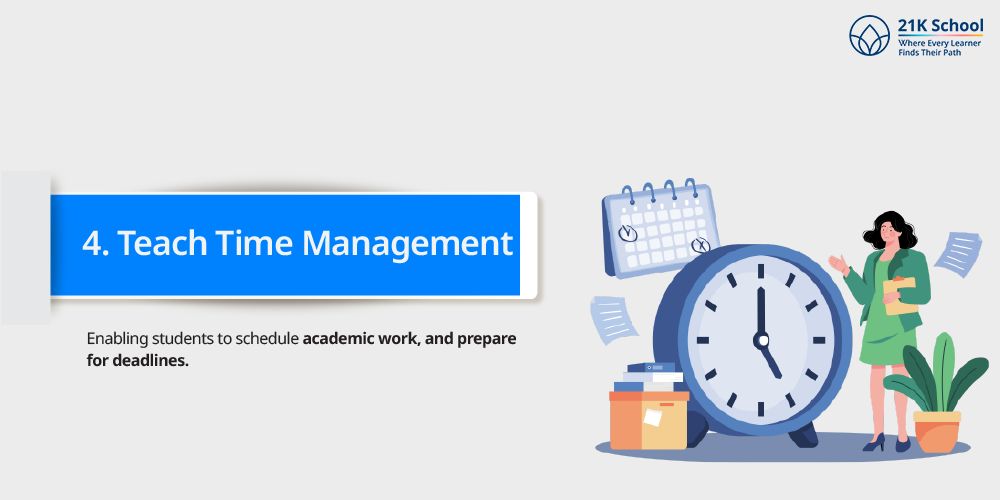
Enabling students to schedule academic work, and prepare for deadlines. Dividing big tasks into smaller pieces helps develop critical time management skills.
Another thing that teachers can do is to introduce tools such as planners, to make lists. They can also utilize apps that could aid students to organize their time better.
5. Promote Consistent Consequences
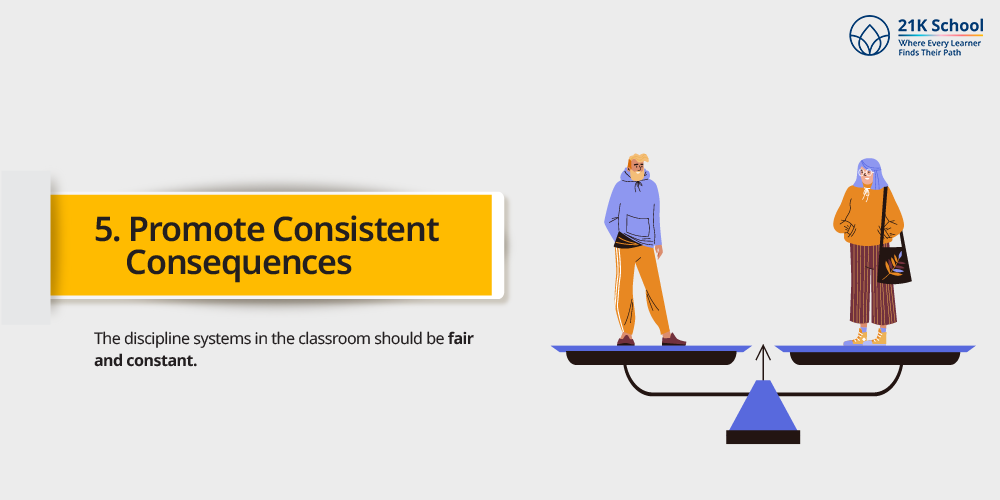
The discipline systems in the classroom should be fair and constant. If the students realise that the consequences are applied randomly or unfairly it destroys trust and leads to fraying up.
Transparent, sensible, and constantly applied consequences bring the sense of order and responsibility.
Concluding Thoughts
Student discipline is an important aspect in excelling academically, learning proper growth, and making good citizens. It is helpful for students to develop self-control, pay attention and make rational decisions.
Discipline is not following rules, it is learning to do the right thing right. Thus creating habits that mean a successful and fulfilling life.
Schools and educators have a significant role in steering the students to disciplined behavior by having set expectations and being examples.
Still, discipline involves students’ self-motivation and continuous work from their side.
If properly cultivated, discipline becomes an asset for life, which enables the students to succeed in all spheres of life.



